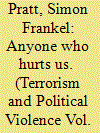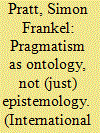|
|
|
Sort Order |
|
|
|
Items / Page
|
|
|
|
|
|
|
| Srl | Item |
| 1 |
ID:
120328


|
|
|
|
|
| Publication |
2013.
|
| Summary/Abstract |
This article examines the evolving logic to the systematic assassinations of Palestinian activists carried out by Israel during the Aqsa Intifada (September 2000-2005). It argues that the logic of Israel's "assassination policy" developed in three stages. During each successive stage, the security executive expanded the scope of who could be legitimately targeted and what goals could be served in doing so. This article further argues that normative and legal considerations played a key role in determining target selection and tactical means. It finds that during the Aqsa Intifada, the Israeli government used assassination not according to any unified purpose but rather as an evolving and often ad hoc combination of political communication, tactical action and, more rarely, strategic manipulation. In short: there was not one single rationale driving the assassinations but several.
|
|
|
|
|
|
|
|
|
|
|
|
|
|
|
|
| 2 |
ID:
148678


|
|
|
|
|
| Summary/Abstract |
This article is in many ways a pragmatist’s critique of pragmatism in international relations (IR), focusing on what practices scholars have engaged in by drawing upon pragmatism and how to resolve problems that become apparent in considering them. Scholars of IR have used pragmatism largely (though not exclusively) to examine issues of an epistemological or methodological nature, focusing mainly on pragmatism as a philosophy of science. Often overlooked, however, is that pragmatism is not just a philosophy of science, but a distinctive and in some respects quite radical school of metaphysics, and it implies a particularly flexible form of social ontology. I, thus, argue for broader horizons in pragmatist theory in IR. I criticize the overly epistemological or methodological focus of the existing ways many IR scholars have used pragmatism and discuss of how pragmatist social theory fits within existing scholarship in the field. Finally, I suggest how pragmatist social theory can contribute to ongoing IR research programs by dissolving the dualisms of agent and structure, realism and idealism, and normative and strategic action. In other words, as a coherent set of principles, pragmatism offers the foundations for a new movement in the study of international politics—indeed, such a movement has already begun, and I suggest that its horizons are particularly broad.
|
|
|
|
|
|
|
|
|
|
|
|
|
|
|
|
| 3 |
ID:
153914


|
|
|
|
|
| Summary/Abstract |
I propose a relational understanding of ontological security, based on a synthesis of pragmatist philosophy and relational sociology. This relocates the referent of ontological security from the self to the social arrangements where action takes place. It implies that actors seek not to secure the coherence and stability of self in particular, but rather of their broader social context. By taking this relational approach, international relations scholars may avoid methodological difficulties in accessing or defining the cognitive or affective processes shaping certain actors, while honing in on the social embeddedness of action. I outline three causal mechanisms for theorizing ontological security in particular cases: refereeing, performative deference, and obstructive resistance. I do so with reference to prominent methodological frameworks in relational sociology—namely, those based on fields and on figurations, respectively. Finally, I connect this new approach to theorizing ontological security to existing trends in relational international relations research. I argue that it provides a theoretical architecture more sensitive to action and agency than is offered by many existing relational approaches, and is especially well suited to the study of precarious forms of transnational life.
|
|
|
|
|
|
|
|
|
|
|
|
|
|
|
|
|
|
|
|
|